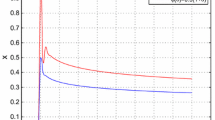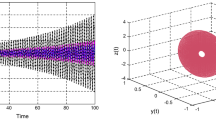Abstract
This paper investigates the inverse Lyapunov theorem for linear time invariant fractional order systems. It is proved that given any stable linear time invariant fractional order system, there exists a positive definite functional with respect to the system state, and the first order time derivative of that functional is negative definite. A systematic procedure to construct such Lyapunov candidates is provided in terms of some Lyapunov functional equations.
Similar content being viewed by others
References
Svante W and Lars E, Capacitor theory, IEEE Transactions on Dielectrics and Electrical Insulation, 1994, 1(5): 826–839.
Cao X, Abhirup D, Fahad A B, et al., Fractional-order model of the disease Psoriasis: A control based mathematical approach, Journal of Systems Science and Complexity, 2016, 29(6): 1565–1584.
Monje C A, Chen Y, Vinagre B M, et al., Fractional-Order Systems and Controls: Fundamentals and Applications, Springer-Verlag, London, UK, 2010.
West B J, Fractional Calculus View of Complexity: Tomorrow's Science, CRC Press, New York, 2016.
Podlubny I, Fractional-order systems and PI λ Dμ-controllers, IEEE Transactions on Automatic Control, 1999, 44(1): 208–214.
Oustaloup A, Cois O, Lanusse P, et al., The CRONE aproach: Theoretical developments and major applications, IFAC Proceedings Volumes, 2006, 39(11): 324–354.
Matignon D, Stability properties for generalized fractional differential systems, ESAIM: Proceedings, 1998, 5: 145–158.
Liang S, Wang S, and Wang Y, Routh-type table test for zero distribution of polynomials with commensurate fractional and integer degrees, Journal of the Franklin Institute, 2017, 354(1): 83–104.
Farges C, Moze M, and Sabatier J, Pseudo-state feedback stabilization of commensurate fractional order systems, Automatica, 2010, 46(10): 1730–1734.
Vinagre B M and Feliu V, Optimal fractional controllers for rational order systems: A special case of the Wiener-Hopf spectral factorization method, IEEE Transactions on Automatic Control, 2007, 52(12): 2385–2389.
Lu J and Chen Y, Robust stability and stabilization of fractional-order interval systems with the fractional order: The 0 α 1 case, IEEE Transactions on Automatic Control, 2010, 55(1): 152–158.
Padula F, Alcántara S, Vilanova R, et al., H ∞ control of fractional linear systems, Automatica, 2013, 47(7): 2276–2280.
Liang S, Peng C, Liao Z, et al., State space approximation for general fractional order dynamic systems, International Journal of Systems Science, 2014, 45(10): 2203–2212.
Khalil H K, Nonlinear Systems, 3rd Edition, Prentice Hall, New Jersey, 2002.
Li Y, Chen Y, and Podlubny I, Mittag-Leffler stability of fractional order nonlinear dynamic systems, Automatica, 2009, 45(8): 1965–1969.
Aguila-Camacho N, Duarte-Mermoud M A, and Gallegos J A, Lyapunov functions for fractional order systems, Communications in Nonlinear Science and Numerical Simulation, 2014, 19(9): 2951–2957.
Sabatier J, Merveillaut M, Malti R, et al., How to impose physically coherent initial conditions to a fractional system?, Communications in Nonlinear Science and Numerical Simulation, 2010, 15(5): 1318–1326.
Trigeassou J C, Maamri N, Sabatier J, et al., State variables and transients of fractional order differential systems, Computers and Mathematics with Applications, 2012, 64(10): 3117–3140.
Sabatier J, Farges C, and Trigeassou J C, Fractional systems state space description: Some wrong ideas and proposed solutions, Journal of Vibration and Control, 2014, 20(7): 1076–1084.
Montseny G, Diffusive representation of pseudo-differential time-operators, ESAIM: Proceedings, 1998, 5: 159–175.
Trigeassou J C, Maamri N, Sabatier J, et al., A Lyapunov approach to the stability of fractional differential equations, Signal Processing, 2011, 91(3): 437–445.
Hartley T T, Trigeassou J C, Lorenzo C F, et al., Energy storage and loss in fractional-order systems, Journal of Computational and Nonlinear Dynamics, 2015, 10(6): 061006.
Trigeassou J C, Maamri N, and Oustaloup A, Lyapunov stability of commensurate fractional order systems: A physical interpretation, Journal of Computational and Nonlinear Dynamics, 2016, 11(5): 051007.
Trigeassou J C, Maamri N, and Oustaloup A, Lyapunov stability of noncommensurate fractional order systems: An energy balance approach, Journal of Computational and Nonlinear Dynamics, 2016, 11(4): 041007.
Bonnet C and Partington J R, Coprime factorizations and stability of fractional differential systems, Systems & Control Letters, 2000, 41(3): 167–174.
Author information
Authors and Affiliations
Corresponding author
Additional information
This research was supported by Fundamental Research Funds for the China Central Universities of USTB under Grant No. FRF-TP-17-088A1.
This paper was recommended for publication by Editor ZHAO Yanlong.
Rights and permissions
About this article
Cite this article
Liang, S., Liang, Y. Inverse Lyapunov Theorem for Linear Time Invariant Fractional Order Systems. J Syst Sci Complex 32, 1544–1559 (2019). https://doi.org/10.1007/s11424-019-7049-z
Received:
Revised:
Published:
Issue Date:
DOI: https://doi.org/10.1007/s11424-019-7049-z




